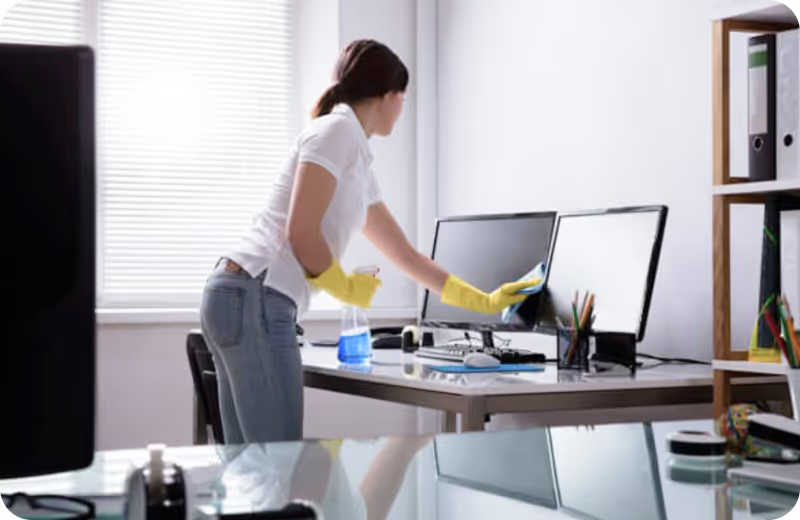
Ultimate Toilet Cleaning Hack
Has your toilet reached a point where there are gross rings and stains around it? Don’t reach for those nasty chemical cleaners! Instead, look through your cupboard for the ultimate household cleaner - vinegar.

Is Vinegar Good at Cleaning?
Due to its acidic nature, vinegar makes for an effective cleaner for countertops, tiles, grout, sinks, and toilets. While its disinfecting properties are still up to debate, the acetic acid concentration in vinegar does wonders to get rid of tough stains, odors, mold, and streaks. Uses for vinegar in cleaning include:
- Killing Mold and Mildew
- Clarifying Glass
- Remove Tarnish from Metals
- Deodorize Laundry and Fabrics
- Preventing Streaks in a Dishwasher
- Clean Limescale and Dirt Buildup from Toilets
In this guide, we’ll be showing you a step-by-step tutorial on cleaning toilets with vinegar. Ideally, you’d want to use industrial cleaning vinegar with an acetic acid concentration of 20%, but that bottle of white or distilled vinegar in your kitchen works just as well.
Cleaning Toilets with Vinegar
Using vinegar to clean toilets is not unheard of. Why not? Vinegar is a non-toxic, inexpensive alternative to harsh cleaning chemicals that can irritate the skin and eyes.
With an acidity pH level of 2.4, vinegar is effective in killing mold that breeds beneath the rim, dissolving limescale and mineral deposits, and getting rid of gunk buildup. You can use vinegar by itself, or mix it with baking soda or borax for a stronger and more efficient solution.
How to Use Vinegar to Clean Your Toilet: A Step-by-Step Guide
We’ll be providing two DIY Vinegar Toilet Cleaners - one for slight stain and buildup, and one for tougher stains that will need a little more elbow grease.

For Light Stains - General Cleaning
What You’ll Need
- White or Distilled Vinegar*
- Spray Bottle
- Toilet Brush
- Cloth
- Gloves and Mask
Step-by-Step
- Wear gloves and a mask if you are particularly sensitive to the acidity or smell of vinegar.
- Pour vinegar into a clean spray bottle.
- Use the spray bottle to apply vinegar all around the toilet bowl, including the rim, the lid, flush handle, and the outer surfaces.
- Pour the remaining vinegar into the toilet bowl. Let sit for 10 minutes.
- Using a toilet brush, scrub away the loosened grime.
- Use a clean cloth to wipe dry the outer surfaces, lid, and flush handle.
- Flush the toilet until vinegar is completely gone.
- Repeat the process until stains are removed.

For Tough Stains - Spot Cleaning
What You’ll Need
- White or Distilled Vinegar*
- Baking Soda
- Essential Oils (Optional)
- Old Toothbrush
- Toilet Scrubber
- Gloves and Mask
Helpful Tip: Make sure to use white vinegar and not apple cider vinegar as the latter can create stains of its own.
Step-by-Step
- Wear gloves and a mask if you are particularly sensitive to the acidity or smell of vinegar.
- Mix together baking soda and vinegar until it forms a paste. The mixture will bubble at first, but should eventually integrate into a paste. If your mixture does not bubble, it means your baking soda is inactive and you’ll need to grab a fresh box.
- Add essential oils, if using. We recommend using fragrant, citrus scents like lemon, orange, or grapefruit.
- Using an old toothbrush, apply the baking soda-vinegar mixture to spots with heavy or tough stains.
- Gently but firmly scrub the areas to loosen the dirt. Let the paste sit until dried, around 10-15 minutes.
- Once dried, use an old toothbrush to scrub away at the loosened grime. Wipe clean with a cloth (for outer surfaces) and flush the toilet to rinse out the inside of the bowl.
- You may also dilute the mixture with more distilled vinegar, and pour into the toilet bowl to remove limescale buildup and gunk. The mixture will also clear clogged pipes.
- Repeat the process until all stains are removed. If stains are seemingly permanent, best to seek professional part time maid services for a more thorough cleaning.
What Not to Clean with Vinegar
Although we’ve established that vinegar can be used for more than just making salad dressing, there are a few limitations to what vinegar can come in contact with:
- Natural Stone - Natural stone surfaces look elegant and are relatively easy to maintain; however, acidic substances like vinegar can damage the varnish and corrode the natural stone. Keep this in mind when cleaning your toilet if you have marble or granite flooring or countertops.
- Black Mold - Some varieties of black mold can pose serious health threats and should never be treated without professional services. Toxic black mold usually appears on porous surfaces after prolonged exposure to moisture, such as after a flood or pipe leak. If you are unsure of the kind of mold you’re dealing with, best to leave it to the professionals for testing and removal.
- Steam or Laundry Iron - Though vinegar can deodorize clothes, never put vinegar into your steam or laundry iron as it can damage the internal mechanism. When in doubt, always refer to the manufacturer’s recommendations on proper device usage and care.
- Delicate Fabric - Thinking of keeping a bottle of vinegar alongside your cleaning supplies? Just make sure that the bottle and its contents does not come in prolonged contact with delicate fabrics, as to prevent discoloration or damage.
Clean Toilet with Vinegar: Should You Do It?
Overall, vinegar makes a surprisingly good cleaner. Consider keeping a separate bottle of distilled white vinegar as a staple cleaning supply. Remember that, although vinegar does a great job of cleaning, it cannot disinfect and must not be used as such.


























